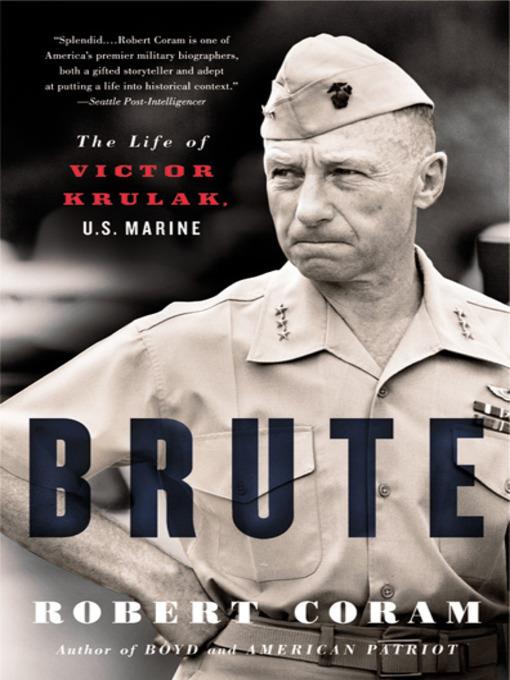
Brute
The Life of Victor Krulak, U.S. Marine
کتاب های مرتبط
- اطلاعات
- نقد و بررسی
- دیدگاه کاربران
نقد و بررسی

September 27, 2010
Coram (Boyd: The Fighter Pilot Who Changed the Art of War) clearly admires Krulak (1913–2008), a contentious Marine leader, and most readers will agree. Son of Jewish immigrants (a fact he suppressed), he attended Annapolis to obtain a free education. After observing Japanese naval operations as a young officer in 1937, he worked tirelessly to promote his design for what later became the Higgins boat, which proved essential for WWII amphibious operations. A decade later, he fought for acceptance of the helicopter. Krulak won numerous decorations for courage and rose to high command, where, Coram claims, his Marines enjoyed greater success than the army in Vietnam, although bitter quarrels with superiors and President Johnson over the war's conduct denied him his dream of becoming Marine Corps commandant. Despite Coram's high regard for Krulak and worshipful view of the Marines, he reveals innumerable details that Krulak suppressed, distorted, or invented in oral histories. Coram portrays a driven, fiercely outspoken. but creative warrior who probably deserves his legendary status. 8 pages of b&w photos.

September 1, 2010
The story of a legendary Marine Corps commander who championed innovative tactics in World War II, Korea and Vietnam.
In this admiring biography, novelist and biographer Coram (American Patriot: The Life and Wars of Colonel Bud Day, 2007, etc.) traces the life of Lt. Gen. Victor Krulak (1913–2008), who was born the spoiled only child of a Denver watchmaker and grew up to become "a man of dazzling intellect and extraordinary vision" and "the most important officer" in Marine Corps history. Against the broader story of the modern U.S. Marines, the author shows how Krulak's tremendous drive and friendships with top officers fueled his rapid rise through the ranks; he eventually commanded all Marine Corps forces in the Pacific. He helped create the Higgins boat (its square bow became a retractable ramp), which famously carried troops onto the invasion beaches of Normandy and the Pacific in World War II; pioneered the use of helicopters in battle during the Korean War; and developed techniques for counterinsurgency warfare in Vietnam. He also successfully fought attempts to dissolve the Corps. But Krulak's ceaseless quest for recognition was "driven by a dark wind." The short, flinty officer hid secrets and told lies about himself. He never revealed that his parents were Russian Jews. Nor did he tell anyone—not even his wife and three sons—that he had been married, however briefly, at 16, a fact that would have prevented his admission to the Naval Academy. He claimed falsely that he was raised as an Episcopalian, that his father was a scientist and his great-grandfather had served in the Confederate army. Saddled with these and other lies, Krulak maintained an "icy self-control" to protect his inner self and the reality that "were it not for the Marine Corps, he would be an obscure little Jewish boy working in the family jewelry business in Denver." Coram suggests that Krulak's exemplary devotion to military duty and rectitude outweighs his duplicity. Krulak was denied the post of Marine Corps commandant after criticizing President Johnson's conduct of the Vietnam War.
A revealing—and troubling—portrait of a much-revered figure.
(COPYRIGHT (2010) KIRKUS REVIEWS/NIELSEN BUSINESS MEDIA, INC. ALL RIGHTS RESERVED.)

November 1, 2010
Corams third fine biography of one of the American armed forces stormy petrels tells the life of Lieutenant General Victor Krulak, U.S. Marine Corps. Krulak began his public career by concealing his Jewish background at Annapolis, then went on to see combat in WWI. Between the wars, he carried out covert intelligence missions and development work on the equipment for amphibious operations. After combat in WWII, he was invaluable in the Pentagon infighting that saved the marine corps both then and after Korea. He commanded the marines in the Pacific during part of the Vietnam War, and his disagreements with Kennedy, Johnson, and McNamara probably cost him his chance to be commandant of the corps. Something of a diamond in the rough, he lived to see two of his sons as prominent Episcopal clergymen and his other son retire as commandant of the corps. Probably the best epitaph for Krulak is the one he might well have preferred: a good Marine.(Reprinted with permission of Booklist, copyright 2010, American Library Association.)

























دیدگاه کاربران